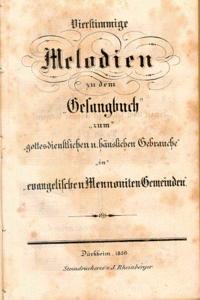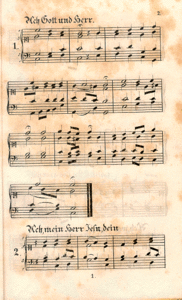Choral-Books (Choralbuch)
From the beginning the Anabaptists were averse to the cultivation of the type of music used in the worship of the Roman Catholic and Protestant state churches. The martyr hymns of the first Anabaptist hymnals were sung only to familiar folk tunes. Later, however (18th century), the hymnals of the state churches came into general use. Thus in the Palatinate the old Palatine hymnal was used in nearly all the congregations. Only in Holland was a distinctive Mennonite collection of songs produced. Choral-books (collections of chorals) did not come into general use in Holland until the first organs were put into the churches: Utrecht in 1765, Haarlem in 1771, Amsterdam in 1773, Rotterdam in 1776, Zaandam in 1782, etc.
The city congregation in Danzig had a manuscript choral-book of its own since the installation of its organ in 1805; it was revised and recopied in 1905. The original of 1805 is now in the custody of the Mennonite Library and Archives at North Newton, Kansas.
When the Mennonite hymnal of 1832, Christliches Gesangbuch, Zunächst für den Gebrauch der Taufgesinnten in der Pfalz, was introduced in the Palatinate, the principal hymns of which were provided with melodies, J. Ellenberger I, preacher of Friedelsheim, made up a book of four-part harmonies for the hymnal, and had it lithographed. It found its way into most Mennonite homes. Ellenberger was also the first Mennonite minister of the Palatinate to cultivate successful singing in choruses, establishing a mixed chorus, and later a men's chorus; the former remained in existence until the beginning of the 20th century. Also in the Weierhof congregation choral music was successfully used and cultivated with artistic understanding. When the new hymnal of 1856, titled Gesangbuch zum gottesdienstlichen and häuslichen Gebrauch in Evangelischen Mennoniten-Gemeinden, came into use in the congregations of Hesse and the Palatinate, Ellenberger also furnished a lithographed book of four-part harmonies for it under the title, Vierstimmige Melodien zu dem Gesangbuch zum gottesdienstlichen and häuslichen Gebrauche in Evangelischen Mennoniten-Gemeinden (Durkheim, 1856). In 1874 a new edition appeared in book form (3d revised ed., 1897), with the G clef for the soprano and alto in place of the C clef, which was no longer understood by many singers and organists.
- Vierstimmige Melodien title page and p. 1
The movement of the 19th century to promote the use of the original pure melodies in church services led to the appearance of a new edition of the above under the auspices of Thomas Löwenberg of Ibersheim and L. Wettschureck of the Weierhof school, in which some runs and elaborations were removed from the tunes, and the melody and rhythm largely restored to their primitive form. Wettschureck also worked out in co-operation with a committee a new choral-book for the hymnal issued in 1910 by the Conference of the Mennonites of South Germany, in which each song was provided with a four-part harmony.
In 1883, when Thiensdorf became the first rural church in West Prussia to install an organ, the Protestant choral-book of the churches of East and West Prussia was adopted; however, some other tunes considered necessary were added by hand. As all the Mennonite churches of West Prussia gradually installed organs or at least parlor organs, a need was felt for a choral-book of their own; it was produced in 1898 (second edition 1935) by a committee, and was thereafter used in the Mennonite congregations of West Prussia, sometimes in addition to the Protestant hymnal. It bears the title Choralbuch zu den Gesangbüchern für Mennoniten-Gemeinden, herausgegeben von der Konferenz der Ost- and Westpreussischen Mennoniten-Gemeinden.
The North American Mennonites by about 1890 furnished each hymn of their hymnals with a four-part harmony, making the use of a separate choralbook superfluous; hence no choral-book has ever been published by the Mennonites here. The only exception to this is the reprinting of the Franz Choralbuch for the Manitoba Mennonites of Russian origin.
For an account of the Franz choral-book used by the Mennonites of South Russia, see the article. A new choral-book was published in 1914 by the Mennonite General Conference at Halbstadt, with the following title: Choralbuch zum Gebrauch für Kirche, Schule and Haus, mit Berücksichtigung des mennonitischen Gesangbuches, zusammengestellt im Auftrage der A11gemcinen Konferenz der Mennoniten-Gemeinden Russlands (first ed., Halbstadt, Taurida, 1914).
Bibliography
Neufeld, V. "The Danzig Choral Buch." Mennonite Life 3 (April 1948): 35.
Hege, Christian and Christian Neff. Mennonitisches Lexikon, 4 vols. Frankfurt & Weierhof: Hege; Karlsruhe; Schneider, 1913-1967: v. I, 347.
| Author(s) | Christian Neff |
|---|---|
| Date Published | 1953 |
Cite This Article
MLA style
Neff, Christian. "Choral-Books (Choralbuch)." Global Anabaptist Mennonite Encyclopedia Online. 1953. Web. 12 Feb 2026. https://gameo.org/index.php?title=Choral-Books_(Choralbuch)&oldid=104952.
APA style
Neff, Christian. (1953). Choral-Books (Choralbuch). Global Anabaptist Mennonite Encyclopedia Online. Retrieved 12 February 2026, from https://gameo.org/index.php?title=Choral-Books_(Choralbuch)&oldid=104952.
Adapted by permission of Herald Press, Harrisonburg, Virginia, from Mennonite Encyclopedia, Vol. 1, pp. 564-565. All rights reserved.
©1996-2026 by the Global Anabaptist Mennonite Encyclopedia Online. All rights reserved.


